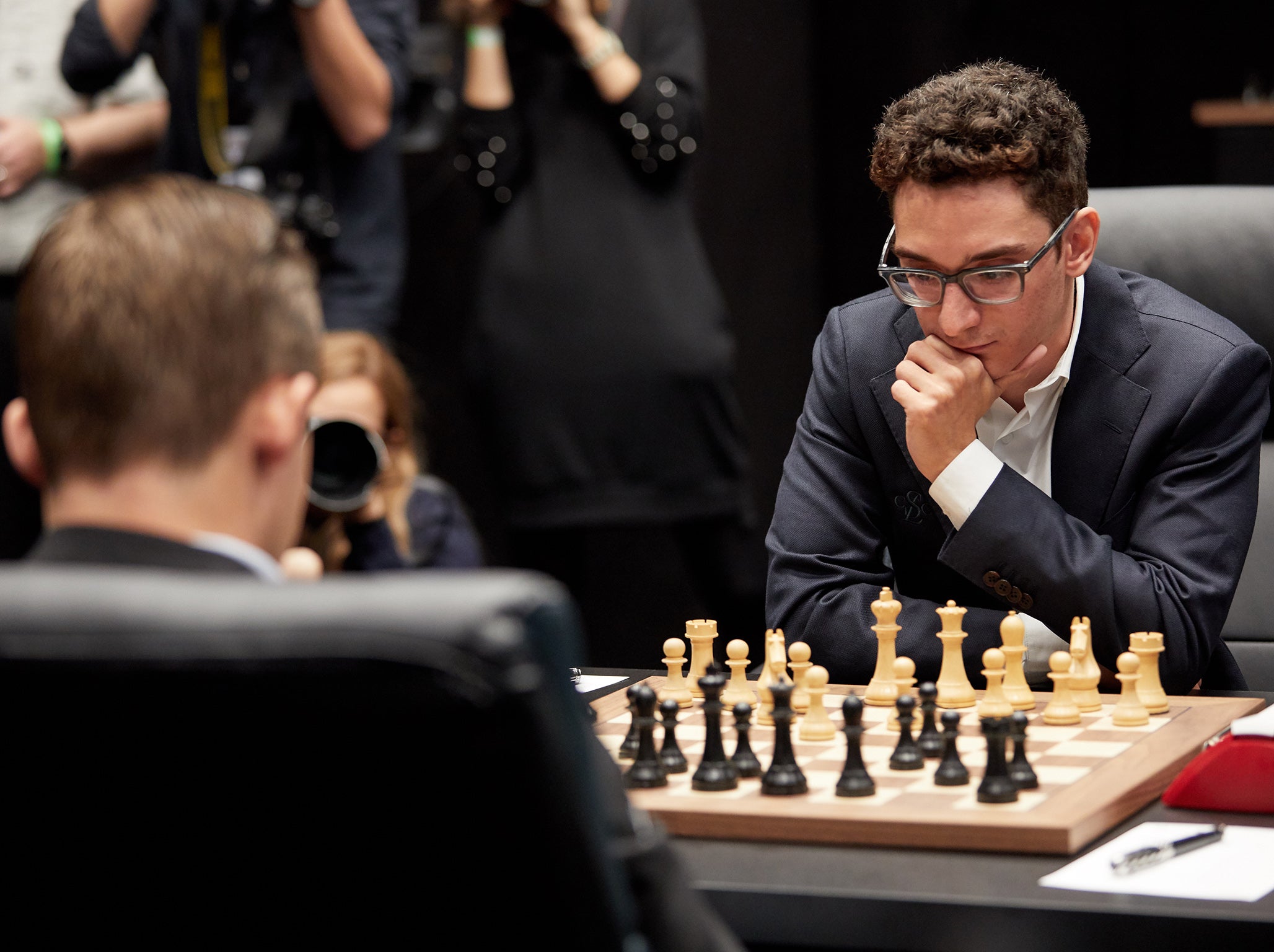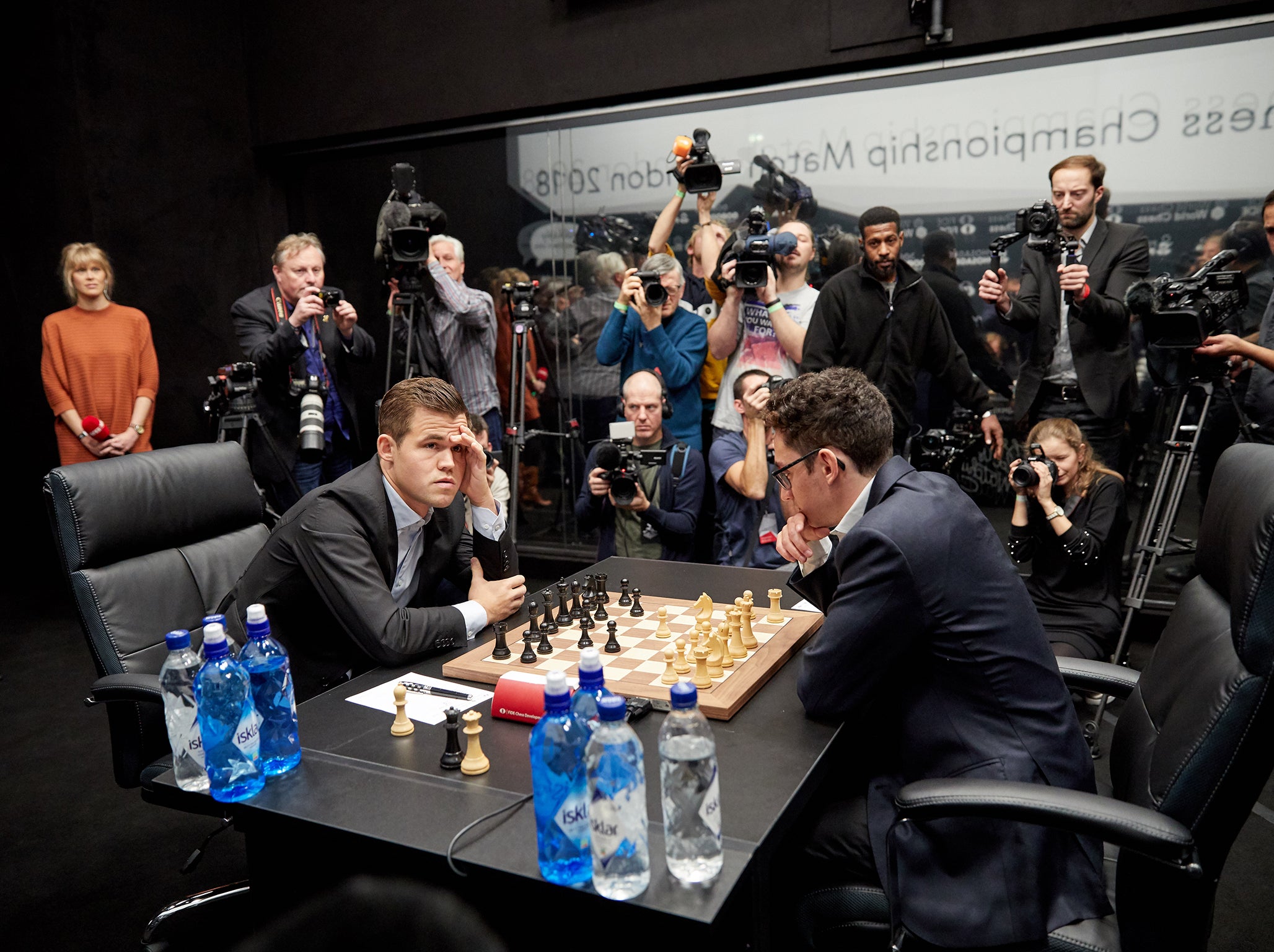
If you want Londoners to come and gawp at something, put it in a glass box. They flocked to see a fasting David Blaine suspended above the Thames. They went nuts for Damien Hirst’s pickled shark. Jeremy Bentham’s severed head gave the greatest queasiness to the greatest number. And to the above we can now add the World Chess Championship, currently unfolding at The College in Holborn, in a setting resembling a large museum display case.
Behind unidirectional glass, for hours at a time, sit Magnus Carlsen of Norway and Fabiano Caruana of the United States, doing battle in the third of their 12-match world championship series. The room is sparse and harshly lit. Just a few bottles of water, a couple of cameras, and on the other side of the glass, several hundred spectators sitting in pure silence.
In many ways, it’s a fitting motif for this Victorian-era curiosity taking place in a Victorian-era building, the former site of Saint Martins art college. It was in 1886 that Wilhelm Steinitz and Johannes Zukertort sat down in New York for what would later become recognised as the first official world championship game. More than 130 years later, only a handful of men have ever held the crown. Steinitz was the first. Carlsen is the 16th. Caruana wants to be the 17th.
They often compare Caruana to the great Bobby Fischer, the only American ever to be world champion. But despite both being young, brilliant and from Brooklyn, the analogy doesn’t quite work. Fischer, the champion from 1972 to 1975, was an instinctive, mercurial genius prone to wild mood swings, who refused to defend his crown and lived out his final years as a relative recluse, emerging only to spout absurd anti-semitic conspiracy theories.

Caruana, on the other hand, looks pretty much like any other well-off 26-year-old. He has a sensible haircut and wears sensible glasses. He listens to Kendrick Lamar, and spends his spare time doing normal things like playing tennis and doing yoga. If he weren’t one of the world’s best chess players, you could easily imagine him earning a six-figure salary on Wall Street, or playing the sensitive nerd in a primetime sitcom.
On the board, too, Caruana is in many ways the antithesis of the explosive, impulsive Fischer. His practice schedule is famously exhaustive. With the help of a £10,000 desktop he uses to run high-grade chess software and analysis, he will often get through 50 games in a single night online. When Carlsen was asked ahead of the match to describe Caruana in one word, he replied: “Computer”. One popular chess website ran a spoof news story with the headline: “Chess Computer Caught Cheating By Consulting With Fabiano Caruana”.
Chess is far too complex and difficult to play perfectly. There are famously more possible game situations than there are atoms in the universe. Even the best players can’t work it all out. And so they study: past games, opening theory, endgame theory, loading and loading the memory banks in the hope that no position will be unfamiliar to them. At the elite level, games are hardly ever won by a flash of genius, but lost by errors. Great chess is, above all, about the elimination of mistakes.
As a result, it can take a while. Game one, on Friday, lasted a marathon seven hours before finally ending in an exhausting draw after 115 moves. Game two was also drawn, and game three is heading the same way. As they approach the first time control (each player gets 100 minutes for their 40 moves, plus an extra 30 seconds for each move they make), Caruana with the white pieces seems to be in a sort of holding pattern, his time slowly running down, the tight curls on his head similar to millions of tiny thoughts, sprouting forth like tendrils.
Carlsen seems the more restless of the two. Caruana looks like he could sit there until the lights go out and everyone goes home. Carlsen, meanwhile, bears a loaded expression one might occasionally interpret as boredom. He plays quicker and more directly than his opponent. Occasionally he’ll shift forward in his seat so his head is directly over the board, casting his black pieces into ominous shadow. Very often he’ll make a move, take a swig of water and then disappear backstage for several minutes. Invariably, Caruana will still be thinking when he returns.

What goes through a player’s mind during those long, boundless expanses? Is it possible to maintain total concentration for several hours at a time? Or are there micro-moments when they switch off? “Of course, on one hand you’re concentrating and focusing very much,” says Judit Polgar, the greatest female chess player of all time who has beaten Carlsen on several occasions. “But it doesn’t mean you don’t get flashes or ideas out of nowhere. Some music in the background, or whatever feelings drop by.
“Mainly it’s when your opponent is thinking. But it also depends very much on the game. It’s important not to get confused by feelings, which can create a mess in your brain. Like what happened to Magnus in the first game. He kind of lost his focus.”
Carlsen should have won the first game. In a sport where wins are rare and wins with the black pieces are even rarer, he had a golden opportunity to finish Caruana off. The challenger was low on time and at one stage had just three seconds left on his clock. Then fatally, inexplicably, Carlsen blundered and let him back in. If Caruana is the computer, then Carlsen is the human: a man whose powers can occasionally seem superhuman, but whose frailties and failings are in many ways part of his immense appeal.
It’s hard to think of a game or sport with a wider gulf in understanding between the devotee and the casual watcher. If you want to get lost in chess, there’s plenty of it to get lost in. There’s an entire book devoted not simply to the Sicilian Defence (1. e4 c5), not simply to the Najdorf Variation of the Sicilian Defence (2. Nf3 d6 3. d4 cxd4 4.Nxd4 Nf6 5.Nc3 a6), but to the 6. Bg5 variation of the Najdorf. At the other end of the scale, there are those who barely know the moves. But somehow, the magnetic Carlsen and the allure of the world championship have managed to bridge the gap between them.

To describe Carlsen as the most famous chess player in the world is to damn him with laughably faint praise. In a way, he’s bigger than the sport he bestrides: the only genuine global chess star since Garry Kasparov. He’s handsome, in a squishy, little-brother sort of way. He’s modelled clothes and watches, hung out with celebrities, been a guest on The Colbert Report (where Colbert challenged him to a game of rock-paper-scissors, and lost 2-0). He cares just enough to be sincere; he’s indifferent just enough to be cool.
He’s good enough to win most of the time, but not so good he wins all of the time. As game three peters out, Carlsen probes and prowls, gets up from his seat and retakes it, but ultimately Caruana’s position is safe enough. They shake hands for another draw, even though Carlsen could have kept probing for at least another hour. Polgar thinks the blunder in game one is still affecting him. “Today he was completely impatient,” she observes. “It was at least as possible to play on as in the first game. But he didn’t give a damn, really.”
Carlsen may only be 27, but in an increasingly young man’s game, he’s practically a veteran. He’s been playing solidly for around two decades. He’s been a grandmaster for 15 years, world No1 for eight years, world champion for five. Afterwards, during the press conference, one journalist asks Carlsen if he’s still enjoying what he does. “Well, yeah,” he replies, a touch incredulously. “Otherwise I wouldn’t be here.”
For Polgar, it’s a more open-ended question. “This is one of the biggest questions,” she says. “He became world champion, he was top of the world at an early age, he already defended his title twice. So he has all the experiences a chess player can get. Now he’s kind of repeating it, which is obviously a huge challenge.
“Of course he wants to stay World Champion. But he said somewhere that it’s not so much that he wants to win, but that he doesn’t want to lose. It’s completely different for Fabiano, who’s having the time of his life. It’s like somebody’s coming down from the mountain and someone’s going up. I’m not saying Magnus is coming down. But maintaining something is many times more difficult than reaching something.”
If Carlsen loses, you can well imagine his stung pride forcing him into a rematch. If he wins, and especially if he wins comfortably, it’s hard to see what new challenges chess can hold for him. In the meantime, all we can really do is stare into the glass box, scanning for clues, waiting for answers.







